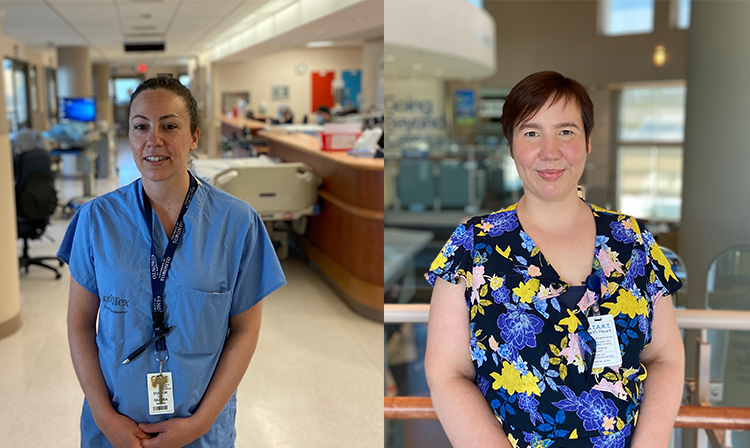Research Spotlight: COVID-19 – Clinical and Research Studies at NYGH

North York General Hospital (NYGH) has launched several COVID-19 clinical and research studies, involving multiple frontline physicians and staff members from different departments across the hospital to advance our understanding and ability to treat this virus. This Research Spotlight features a COVID-19 clinical trial led by Dr. Anna Geagea (Critical Care Unit) and Maria Schlag (Clinical Trials Manager). They provide a snapshot of their COVID-19 study, as well as their thoughts on the future of this disease.
Dr. Anna Geagea and Maria Schlag – Clinical Trials COVID-19 Study
Could you tell us a bit about the COVID-19 study you are performing?
Dr. Geagea: North York General Hospital is participating in the Canadian Treatments for COVID-19 (CATCO) study. The study, sponsored by Sunnybrook Health Sciences Centre and led by Dr. Srinivas Murthy, Clinical Associate Professor, University of British Columbia (UBC), at the national level, and Dr. Robert Fowler, Senior Scientist, Sunnybrook Health Sciences Centre, provincially, is funded by the Canadian Institutes of Health Research. CATCO is the Canadian arm of an unparalleled global collaboration coordinated by the World Health Organization to test potential treatments for COVID-19. This multinational trial named SOLIDARITY is enrolling thousands of patients from around the world with the main goal to rapidly identify drugs to treat COVID-19 that may prove beneficial to patients. The study that we have launched at NYGH is a randomized controlled clinical trial, which is one of the most robust research designs for testing new treatments. Despite the challenges imposed on hospitals by the pandemic, our research team was able to accomplish all the planning and preparation necessary to run a number of clinical trials in a short amount of time. Our study started as a Canadian initiative led by UBC and Sunnybrook but moved to a very large-scale trial when a global decision was made to merge all individual local trials into the SOLIDARITY trial. The merging of the data makes results more generalizable as you have more countries involved and allows measuring the effect of drugs on mortality with the larger number of patients that will be recruited. Effect on mortality is the most important outcome that a trial could be looking at. In fact, the most common question patients ask me is about survival, “how will we as a society survive the current pandemic?” I hope that this trial will answer that question.
At NYGH, we have started with testing lopinavir and ritonavir vs. supportive care, but since the study has an adaptive protocol design, the plan is to broaden the study to hydroxychloroquine and remdesivir soon and possibly, to additional drugs, as more evidence becomes available.
Maria: We’re very fortunate to be able to offer the patients this clinical trial option at North York General. NYGH has extensive experience running clinical trials and over time has created the infrastructure and the clinical support required to contribute to improving patient outcomes. It is very exciting for us to run the trial in the ICU and on the different wards. As Dr. Geagea mentioned, to have a randomized controlled trial is very important as it reduces bias and provides a rigorous tool to make control and treatment groups as balanced as possible. This in turn leads to the generation of strong evidence on whether treatment with drugs like lopinavir and ritonavir for example are working in the fight against COVID-19.
Why is this COVID-19 study for an academic community hospital important?
Dr. Geagea: Running a clinical trial of this size and significance speaks to our ability as an institution to contribute to research, despite having a smaller research capacity than most academic teaching hospitals in Ontario. Also, there are very few community hospitals that are doing this type of trial and we feel fortunate to offer it to our community.
Even though we are presently looking at the trial at the individual level because we want each patient to benefit from the drugs we are offering; I am also looking at it as a population-based initiative. If there is a second wave of COVID-19, we will hopefully have better answers for our patients by then. We want to be as prepared as we can for what might come next.
Maria: From the research team’s perspective, it will be gratifying to be part of something that can improve outcomes for patients suffering from COVID-19.
How do you see the future of COVID-19?
Dr. Geagea: I think it’s very hard to know, and there are probably at least three different scenarios. Firstly, the virus transmission may decrease with time, which is what we are all hoping for; there is also the possibility that when reopening the economy and businesses we get a second wave, which is what we’re all worried about; and the third possibility is just having a seasonal virus, similar to our yearly flu seasons. At this point, no one really knows which scenario is the most likely to happen, it depends on so many factors. Tackling COVID-19 is going to require a sustained effort from everyone and that’s why it’s encouraging that there are many people here in Canada and around the world exploring various drug treatments and vaccines. The drug trials will help identify a good treatment option until a vaccine becomes available.
Maria: It’s a guess for me. From a general prospect it will be good if it finally subsides as no one wants to see any more patients and their families suffer. Ultimately, it’s hard to say, and there’s definitely concerns of what might happen when we start opening up again.
Special acknowledgements:
This clinical trial involves Co-Principal Investigators Dr. Elliott Owen, Dr. Pavani Das, Dr. Phil Shin, and Dr. Eneko Arhanchiague
The research team includes: Shelina Sabur, Tashea Yucca Albano, Alexandra Lostun and Mary Rahmat and Ida Lee
Supporting departments: Lab medicine, Pharmacy, Critical Care Units 7 south east and 8 south east, In-patient unit 8 west, and Clinical Informatics
